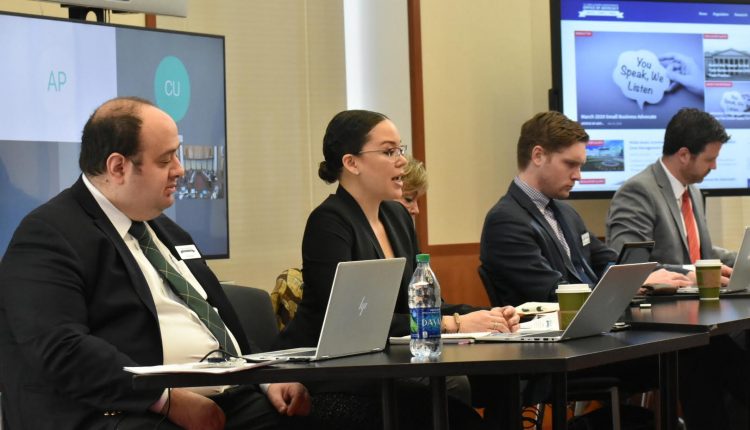
Advocacy’s International Trade Team Goes to Columbus
By Les Davies, Region 5 Advocate
On October 16, 2018, President Trump notified Congress that he intended to negotiate a United States-Japan trade agreement as well as trade agreements with the European Union and the United Kingdom. Under the Trade Facilitation and Trade Enforcement Act (TFTEA), the Office of Advocacy is tasked with producing a report to Congress evaluating the economic impacts of these trade agreements on small businesses.
The importance of these proposed negotiations cannot be overstated. The United States is the world’s largest economy, with Japan third and the United Kingdom fifth. In addition, the United States has a significant economic relationship with the European Union, with nearly $1.3 trillion traded in 2018.[1] In the United States, small business makes up nearly 98 percent of the number of businesses exporting goods and represents 33 percent of United States’ exports annually.
On March 26, 2019, the Ohio State University Fisher College of Business hosted the Office of Advocacy for a small business outreach meeting in Columbus, Ohio, to hear from small businesses on the impact of these proposed trade agreements. Fisher’s Director Joyce Steffan and Dean Anil K. Makhija opened the meeting with a warm welcome to the small businesses and congressional district staff in attendance before the morning discussion got underway.

If One Thing Is Certain, It’s Uncertainty
Currently, the United Kingdom remains part of the European Union, and the timing of their exit from the European Union is undetermined. This makes discussion of the trade agreement just a little uncertain. According to one small agriculture business, it is sometimes easier to export to the European Union than sell in the United States. While the organic standards are different in the European Union compared to the United States, there is a lot of information gaps between markets, such as not knowing how goods are produced on the ground.
Regulatory differences are always a big concern. A small business manufacturer of window washing equipment in Delaware, Ohio, noted that there are multiple different safety agencies in Japan, creating confusion and uncertainty with regulatory compliance. Industry norms and safety regulations are also a big concern. The small business said each time it would satisfy a standard, the Japanese government would change it. What the small businesses want is more certainty with standards and regulations and not a moving target.
What We Have Here Is A Failure To Communicate
Several businesses cited the cultural and language barriers with Japan as obstacles. From a cultural standpoint, establishing relationships is a big barrier to business startups. A scaffolding company was told to first open an office in Japan and hire locals for several years before seeking clients. Meanwhile, a Japanese scaffolding company dominates the Japanese market and is also doing business in the United States. The American small business says it is unable to get a foothold in Japan. Another new manufacturer who tried to get into the Japanese market spent a large sum of money but later pulled out because the owner felt that Japan was a closed market.
Aside from the culture, language is also a major barrier. Knowing what the regulations are is a huge problem; companies can’t determine what the standards are since the information isn’t in English. Small businesses told us that navigating regulation issues with Japan is even harder than finding business partners.
The Trouble Is Tariffs
One of the aims in negotiations is to address both tariff and non-tariff barriers and to achieve fairer and more balanced trade, consistent with the objectives of Congress. When discussing international trade, tariffs are almost always part of the conversation. One small business we spoke to reported that it was hit hard by some unintended consequences of tariffs last year. The company primarily gets steel domestically and procuring stainless steel at a good price is tough. Some American companies are raising steel prices to just under the level of imported steel plus the tariff.
Final Thoughts
Paperwork continues to be a major concern and many in attendance agreed that any international trade agreement should aim to include digital or blockchain technology for consistency and security. This would be helpful for certificates of origin and tracing product movement. All in all, the feeling is that trade needs to be fairer, regulations more consistent, and barriers like language and culture addressed in some meaningful way.
Advocacy was in Columbus, Ohio for a Small Business Outreach Meeting on Trade Agreements with Japan, the European Union, and the United Kingdom March 26.
If you were unable to attend this event but would like to provide your feedback to the Office of Advocacy, please email your name, company, industry, and business size (number of employees) to AdvoTradeFeedback@sba.gov.
Les Davies serves
as the Region 5 Advocate for the SBA Office of Advocacy, representing small
businesses in Illinois, Indiana, Michigan, Minnesota, Ohio, and Wisconsin.
Davies works with small business owners, state and local governments, and small
business associations to bring the voice of Region 5 to Washington DC. He can
be reached at Leslie.Davies@sba.gov.
[1] Office of the U.S. Trade Representative. (2019). European Union. Retrieved from https://ustr.gov/countries-regions/europe-middle-east/europe/european-union.
